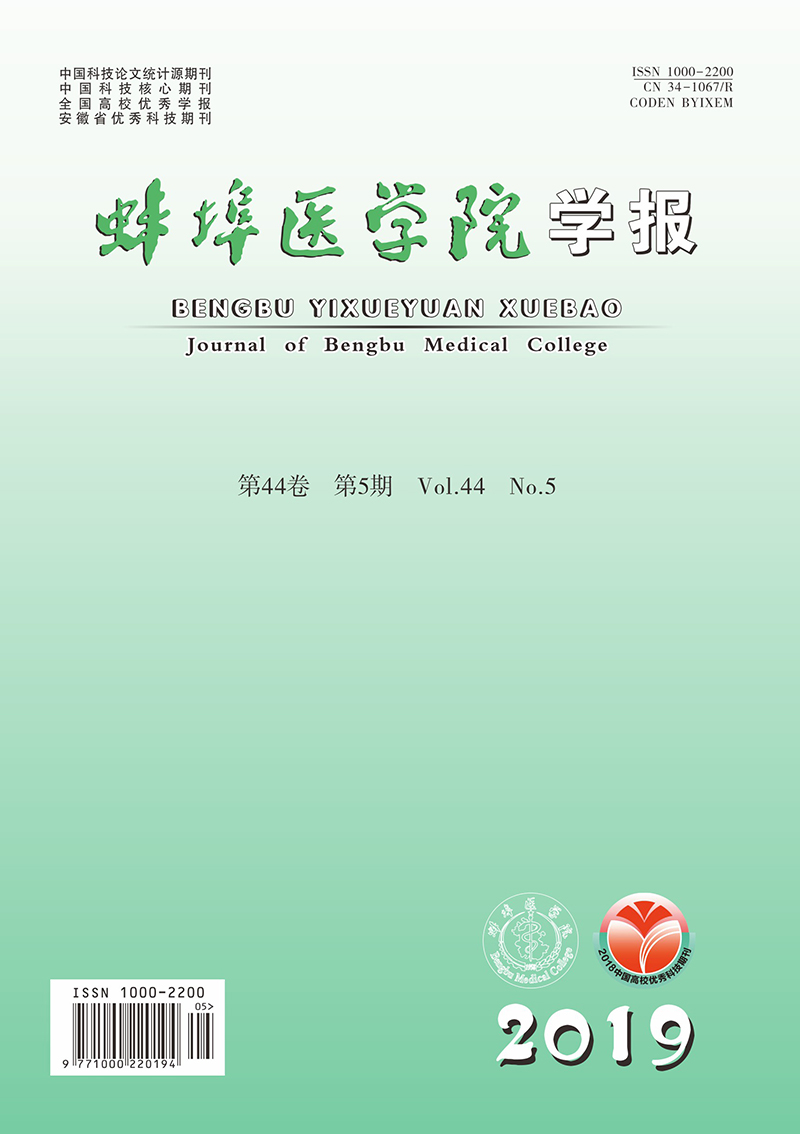-
晚期结直肠癌(metastatic colorectal cancer,mCRC)给予一线化疗联合贝伐珠单抗可使病人的生存获益,目前尚无确切的生物标志物用于疗效预测[1]。贝伐珠单抗属人源性血管内皮生长因子(VEGF)抑制剂,具有抗转移器官血管生成的作用[2]。存在KRAS基因突变提示mCRC病人复发转移的风险较高,将其作为生物标志物用于预测贝伐珠单抗抗VEGF的作用尚存争议[3]。本研究对mCRC病人给予一线化疗联合贝伐珠单抗治疗,探讨KRAS基因状态对疗效的预测价值。现作报道。
HTML
-
选择2013年6月至2018年6月就诊的mCRC病人。mCRC诊断标准参照中华医学会肿瘤学分会“中国结直肠癌诊疗规范(2015版)”。所有病人均有病理或细胞学检查支持并签署知情同意。采用等位基因特异PCR扩增法(ARMS)及Sanger测序法对KARS基因突变进行检测。有216例行KRAS基因突变检测的mCRC病人入组。其中男129例,女87例;年龄35~76岁。
-
根据mCRC病人的病史、影像学和病理检查结果等临床资料,无禁忌证者准予化疗。选择一线化疗(5-氟尿嘧啶、奥沙利铂、卡培他滨和伊立替康)联合贝伐珠单抗的治疗方案(FOLFOX/ FOLFIRI/CapeOx+贝伐珠单抗)。药物剂量及疗程根据具体给药方案制定。拟定为6周期化疗。每4周期化疗结束后,通过结肠镜、腹部B超、增强CT等检查项目,根据实体瘤疗效评价标准(RECIST 1.0)观察病情变化及不良反应。
-
根据KRAS基因有无突变分为KRAS基因突变型组和KRAS基因野生型组。观察2组的原发肿瘤部位、ECOG评分、肿瘤病理分型、术后治疗情况、转移部位及转移部位数等项目有无差异。观察一线化疗联合贝伐珠单抗的反应率(response rate,RR)、无进展生存时间(progress free survival,PFS)和总生存时间(overall survival,OS)。比较2组治疗期间的不良反应。
-
采用t检验、χ2检验、秩和检验及Cox比例风险模型。
1.1. 一般资料
1.2. 化疗方案
1.3. 临床观察指标及终点目标
1.4. 统计学方法
-
入组的216例mCRC病人,分别采用ARMS法对163例、Sanger测序法对53例病人的KARS基因进行检测。检测出KRAS基因突变型79例(36.6%),其中ARMS法61例,Sanger法18例;主要突变位点是第12位密码子(64.6%,51/79)和第13位密码子(32.9%,26/79);KRAS基因野生型137例(ARMS法102例,Sanger法35例;63.4%);2组年龄、性别、原发部位、ECOG评分、治疗情况及转移部位数差异均无统计学意义(P>0.05)。KRAS基因突变组低分化型多于中/高分化型,差异有统计学意义(P < 0.05)。KRAS基因突变型组转移至肺与肝多于KRAS基因野生型组(P < 0.05和P < 0.01)。KRAS基因突变型与野生型比较,低分化型多于中/高分化型,差异有统计学意义(P < 0.01)(见表 1)。
分组 n 年龄(x±s)/岁 男 女 ECOG评分 原发部位 肿瘤病理分型 治疗情况 转移部位 转移部位数 0~1级 2级 左半结肠 右半结肠 直肠 中/高分化腺癌 低分化腺癌 其他(未分化、鳞癌) 术后辅助化疗 初次暴露 肺 肝 淋巴结 腹膜 骨 膀胱 其他部位 ≥2 < 2 KRAS突变组 79 65.6±11.6 46(58.2) 33(41.8) 65(82.3) 14(17.7) 33(41.8) 21(26.6) 25(31.6) 21(26.6) 51(64.6) 7(8.8) 31(39.2) 48(60.8) 61(77.2) 59(74.7) 68(86.1) 25(31.6) 33(41.8) 23(29.1) 15(19.0) 39(54.7) 40(45.3) KRAS野生组 137 66.3±12.5 75(54.7) 62(45.3) 98(71.5) 39(28.5) 57(41.6) 45(32.8) 35(25.5) 53(38.7) 43(31.4) 41(29.9) 63(46.0) 74(54.0) 85(62.0) 76(56.5) 106(77.4) 41(29.9) 46(33.6) 41(29.0) 39(28.5) 63(46.0) 74(54.0) χ2 — 0.41* 0.25 3.13 1.05 24.82 1.12 5.27 7.89 2.42 0.07 1.451 0.00 2.40 0.23 P — >0.05 >0.05 >0.05 >0.05 < 0.01 >0.05 < 0.05 < 0.01 >0.05 >0.05 >0.05 >0.05 >0.05 >0.05 *示t值 -
给予一线化疗联合贝伐珠单抗的化疗方案,KRAS基因突变组总体RR为34.2%,KRAS基因野生型组总体RR为45.2%,2组总体RR差异无统计学意义(χ2=2.494,P>0.05)。KRAS基因突变组和基因野生型组的PFS分别为(9.7±3.6)月和(10.3±3.4)月,2组PFS差异无统计学意义(t=1.223,P>0.05)。KRAS基因突变组比基因野生型组OS减少,分别为(16.5±3.5)月和(17.3±3.4)月,但差异无统计学意义(t=1.648,P>0.05)。Cox生存分析模型显示,KRAS基因突变不能作为PFS(风险比0.967,95%CI=0.731~1.358,t=0.193,P>0.05)和OS(风险比0.533,95%CI=0.238~1.352,t=0.161,P>0.05)的预后因素。
-
给予一线化疗联合贝伐珠单抗治疗,KRAS基因突变型组与KRAS基因野生型组比较,病人出现发热、消化道反应、疲乏感、蛋白尿、骨髓抑制等不良反应情况类似,差异均无统计学意义(P>0.05)(见表 2)。
分组 n 发热 消化道反应 疲乏感 蛋白尿 高血压 鼻出血 脱发 骨髓抑制 KRAS突变组 79 65(82.3) 70(88.6) 29(36.7) 10(12.7) 13(16.5) 7(8.9) 53(67.1) 65(82.3) KRAS野生组 137 109(79.6) 120(87.6) 45(32.8) 20(14.6) 21(15.3) 11(8.0) 89(65.0) 110(80.3) χ2 — 0.236 0.049 0.332 0.158 0.048 0.045 0.101 0.129 P — >0.05 >0.05 >0.05 >0.05 >0.05 >0.05 >0.05 >0.05
2.1. 一般临床资料的比较
2.2. KRAS基因野生型组与突变组疗效终点比较
2.3. KRAS基因野生型组与突变型组治疗的主要不良反应比较
-
mCRC病人给予5-氟尿嘧啶、奥沙利铂、伊立替康、卡培他滨联合靶向制剂为基础的新辅助化疗方案,可使病人的生存时间从12个月增加到2年左右[4]。研究[5]发现,上皮生长因子受体(EGFR)和VEGF与肿瘤细胞的生长、存活、增殖和转移有关。VEGF和EGFR通路相互作用,Ras信号通路则增加VEGF的表达。KRAS蛋白是EGFR信号通路下游的小分子G蛋白,为EGFR信号通路的重要组成部分之一,30%~50%的mCRC在早期进展阶段可以检测到KRAS基因突变。KRAS基因突变后可以导致VEGF信号通路异常激活[6]。提示KRAS基因突变可能影响抗肿瘤血管生成的反应。近年来,已经确立KRAS基因及其下游信号通路在肿瘤发展中的重要性,对KRAS基因突变的生物学和临床作用的监测标志着mCRC治疗出现转折。在我们的研究中,216例mCRC病人进行KRAS基因突变检测,检测出KRAS基因突变型79例(36.6%),KRAS基因野生型137例,KRAS基因野生型与基因突变型比较,年龄、性别、原发部位、ECOG评分及治疗情况相似,具有可比性。在一线化疗的基础上联合贝伐珠单抗治疗,KRAS基因突变组总体RR为34.2%,KRAS基因野生型组总体RR为45.2%。表明联合贝伐珠单抗的化疗方案可明显提高mCRC病人的反应率。2组治疗期间主要不良反应发生情况类似,对药物治疗的耐受性相似。KRAS基因突变组比野生型组更易转移至肺与肝。表明KRAS基因突变的mCRC病人易于出现转移,加重病情。KRAS基因突变型与野生型比较,低分化型多于中/高分化型。表明KRAS基因突变型恶性程度更高。研究[6]表明,mCRC病人给予抗EGFR药物(如西妥昔单抗和帕尼单抗)治疗,KRAS基因突变具有重要预测价值。贝伐珠单抗是人源性抗VEGF单克隆抗体,具有抑制血管生成的作用。目前,由于尚未发现适合的生物标志物推荐用于贝伐珠单抗治疗,将KRAS基因突变作为生物标志物预测贝伐珠单抗抗VEGF的作用仍存在争议。作为对治疗反应有预测作用的生物标志物,一般取决于宿主与肿瘤间的微环境、肿瘤独特的生物学特征、肿瘤自身特点等多个方面[7]。贝伐珠单抗的临床益处是否独立于KRAS基因状态尚不明确。
mCRC发病与特定基因突变导致相关信号通路失调有关。RAS-RAF-MAPK、PI3K-AKT-mTOR两条信号通路,参与细胞的生长、分化、增殖过程。细胞信号通路中分子标志物的异常表达可导致通路的持续活化,在mCRC的发病中起重要作用。KRAS基因突变导致VEGF信号通路异常激活后,可不受VEGF上游蛋白的调控[8]。我们研究发现,KRAS基因突变组和基因野生型组的PFS分别为9.7个月和10.3个月,2组差异无统计学意义。KRAS基因突变组比基因野生型组OS减少,但差异无统计学意义。在HURWITS等[9]研究中,受检标本的KRAS基因突变率分别为34%和29.5%。给予5-氟尿嘧啶、伊立替康福联合贝伐珠单抗的化疗方案(IFL),KRAS基因突变状态与PFS的改善无关,但2组的RR有明显差异;此外,该研究的亚组分析表明,KRAS基因突变病人总PFS和OS较低。
目前,KRAS基因突变状态对mCRC病人抗VEGF治疗的预测价值仍有争议。研究评估KRAS基因状态和生存率之间的关系,分析给予最佳支持治疗对预后的影响[10]。KRAS野生型或其他基因突变类型病人的OS差异无统计学意义。我们采用Cox生存分析模型研究结果显示,KRAS基因突变不能作为PFS和OS的预后因素。国外学者[11]也报道没有证据表明KRAS基因状态对含靶向药物治疗的mCRC病人具有预后价值,我们的研究结果与之类似。同样,PRICE等[12]研究报道表明,对于mCRC病人,KRAS基因突变状态不能用于预测OS及联合贝伐珠单抗治疗的预后观察。然而,BRUDVIK等[13]研究则得出相反结论。该研究共有3 439名病人进入了多变量分析,评价mCRC各阶段KRAS基因突变及对预后的影响。在KRAS基因的第12和13密码子可能的12个突变中,发现有8.6%病人第12密码子出现由甘氨酸到缬氨酸的基因突变,基因突变组的PFS和OS比野生型组有明显的统计学差异,且对Dukes′C肿瘤比Dukes′B肿瘤的影响更大。研究[14-15]表明,在排除了混杂因素后,KRAS基因突变状态与mCRC复发和死亡的风险增加有关,并对Duke′s C G12V突变病人的不良预后有重要的预测价值。
综上所述,我们的研究表明,mCRC给予一线化疗联合贝伐珠单抗治疗,KRAS基因突变状态对疗效尚无预测作用。由于本研究仅对原发部位肿瘤进行KRAS基因状态检测,且不同基因检测方法存在一定的特异性及阳性率,可能影响结果的判断。因此,后续研究应扩大KRAS基因检测数量,统一基因检测的标准,对KRAS基因状态与贝伐珠单抗抗VEGF治疗的相互关系进行深入探索。






 DownLoad:
DownLoad: